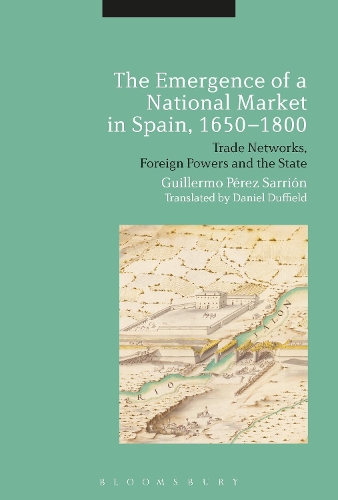
The Emergence of a National Market in Spain, 1650-1800: Trade Networks, Foreign Powers and the State
(Paperback)
Available Formats
Publishing Details
The Emergence of a National Market in Spain, 1650-1800: Trade Networks, Foreign Powers and the State
By (Author) Professor Guillermo Perez Sarrion
Bloomsbury Publishing PLC
Bloomsbury Academic
28th December 2017
United Kingdom
Classifications
Tertiary Education
Non Fiction
382.0946
Physical Properties
Paperback
360
499g
Description
Awarded the Jaume Vicens Vives Prize by the Spanish Association of Economic History, this study analyses the development of the Spanish domestic market from 1650 to 1800, which transformed the country from a pseudocolonial territory, politically and economically dependent on its European neighbours, to a significant European power. The Emergence of a National Market in Spain, 1650-1800 places Spain firmly in a European context, arguing that the origins of a sophisticated economy must be understood through the complex diplomacy of the period, namely the competition between Britain and France for dominance in the Iberian peninsula. It was in response to this rivalry that the Spanish state actively promoted the conditions for economic development in the 18th century, aided by autonomous commercial networks of Catalan merchants, Navarrese tradesmen and migrant French businessmen. This original interpretation by one of Spain's leading economic historians, available in English for the first time, is indispensable reading for students and scholars of Spanish history.
Reviews
It is a meticulously written and highly informative study, and certainly a welcome contribution to an important debate. * Journal of Modern History *
This translation of Prez Sarrin's 2011 work provides Anglophone readers with access to his tremendously dense and thoroughly researched look at the modernization of Spain's internal economy in the period from the late-17th to the mid-19th century, and how it was affected by relations with France and Britain. The author (Univ. of Zaragoza, Spain) provides detailed chapters on monetary policy, customs and currency reform, political unification, and Enlightenment legal reform, all of which provided a rock solid foundation for the edification of a unified Spanish state. There are also chapters on networks of French merchants in Spain and on commercial networks in Catalonia. This volume is of interest to those studying the development of a mercantilist national economy and state, and a must for collections dealing with Spain and early modern state formation. Summing Up: Essential. Graduate students/faculty/professionals. * CHOICE *
This ambitious book combines deep theoretical reflections, challenging questions and new historical data from archives. * European History Quarterly *
Little has hitherto been written about the origins of modern economic growth in Spain. Guillermo Perez-Sarrin has now shed light on a transcendental aspect of this issue: the first stages of the formation of the domestic market in Spain. Thanks to this book, we now know more about its chronology and the roles within this process of the Bourbon State, the expansion of certain economic regions, the great French and English commerce and the Basque, Navarraesen, French, and Catalan commercial and migratory networks. * Enrique Llopis, Complutense University of Madrid, Spain *
Professor Prez Sarrion's book is the product of a very serious, comprehensive and appealing research on the formation of the Spanish domestic market. It breaks with a strong tradition of regional history much present among Spanish historians and instead gives an overview of the whole country. It deals with crucial aspects, such as the abolition and redefinition of internal fiscal frontiers in a composite monarchy as it evolved towards a proto-national state. More importantly, it looks at a factor usually neglected in the literature and which might have been crucial in many countries on Europe's periphery : the role of external actors, in this case France and Britain, and their interest in the rise of a homogeneous economic space. The author does this not so much by looking at trade, but by studying the international and inter-regional migrations and social networks. Prez Sarrin also deals with a crucial problem in the history of Spain: the social and economic articulation of a nation state's space. He does so by rightly maintaining a strictly historical perspective. This is the backbone of the most important political debate in Spain today, increasing the book's interest. * Bartolom Yun Casalilla, Pablo de Olavide University, Seville, Spain *
Author Bio
Guillermo Prez Sarrin is Professor of Early Modern History at the University of Zaragoza, Spain. He has also held positions at Cambridge University, UK, and Rutgers University, USA.
